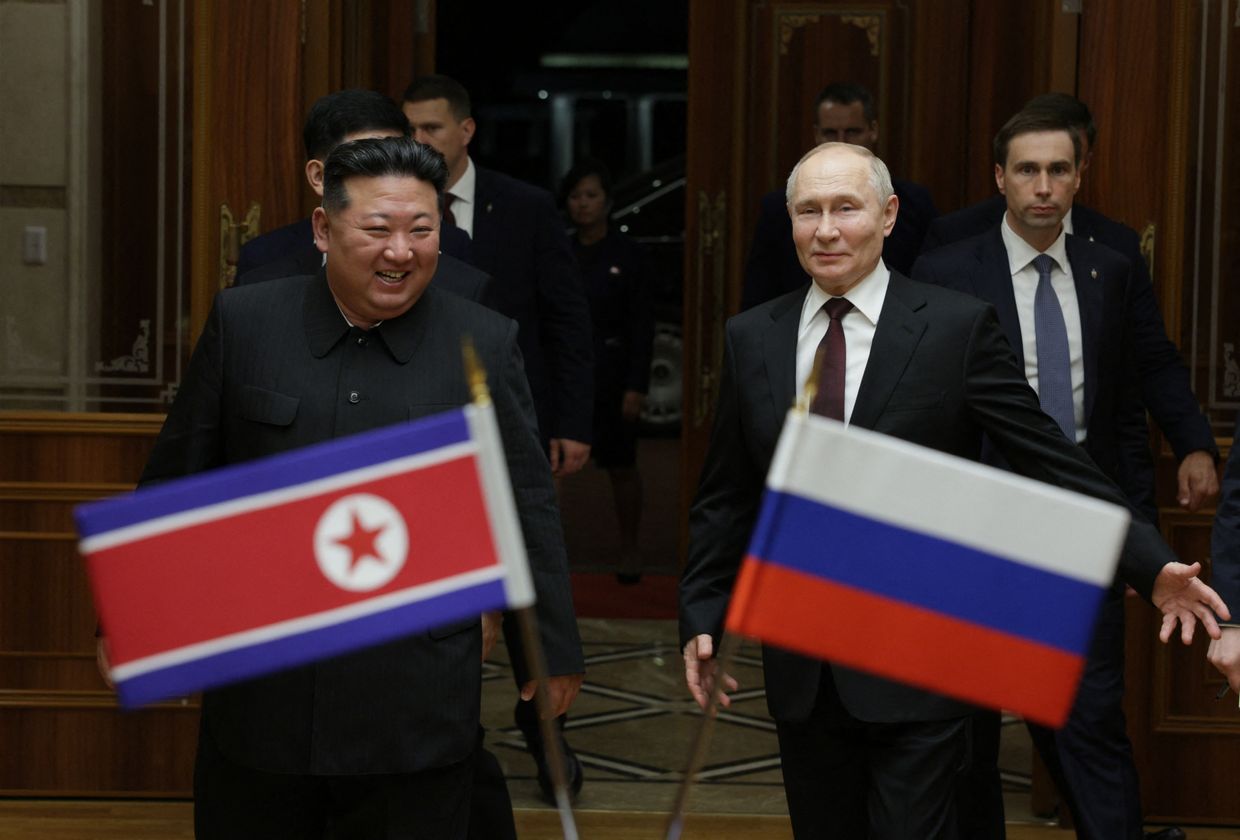Investigation: Despite sanctions, American trucks are being used by Russia to launch kamikaze drones
Despite U.S. sanctions, at least 130 Ram 1500 pickup trucks were imported into Russia after its full-scale invasion of Ukraine — eight of them via a U.S. company.

An American Ram 1500 pickup truck with a Russian suicide drone on top, captured on video released by the Russian Defense Ministry's TV channel on July 20, 2025. (Screenshot from a Russian television segment titled “Defense acquisition. MilTech”)
A U.S. company is among several worldwide that have sold U.S.-made pickup trucks to Russia, despite U.S. sanction restrictions prohibiting the sale of such vehicles to the country, the Kyiv Independent can reveal.
Further, one type of vehicle in particular — Ram 1500 pickup trucks — has recently appeared in Russian state propaganda videos specially adapted to launch kamikaze drones in attacks on Ukrainian cities.
An investigation by the Kyiv Independent reveals several companies located in the United Arab Emirates (UAE), and one based in the U.S. state of Virginia, have helped enable Russia to import at least 130 since the beginning of Moscow's full-scale invasion of Ukraine.
And at least a small percentage of them appear to have made their way to Russia's 'largest and most secret' drone factory.
Russia's 'largest and most secret' drone factory
On July 20, Russian TV channel Zvezda, which is controlled by Russia's Defense Ministry, released a video showcasing a giant drone factory at the Alabuga industrial park near Kazan in the Tatarstan region.
The complex is dedicated solely to churning out thousands of Geran-2 drones, Russia's domestically produced analog of Iranian Shahed drones, which it uses to bombard Ukrainian cities on a nightly basis.
"This is the largest such plant in the world and the most secret," Timur Shagivaliev, CEO of the Alabuga Special Economic Zone, told Zvezda.
As well as the production process, the video also shows one drone being launched — from the back of a modified black Ram 1500 truck. It then goes on to show a total of five such-equipped vehicles.

Launching Geran-2 drones from pickup trucks is not a widespread tactic, a source in Ukraine's military intelligence (HUR), told the Kyiv Independent.
"It is difficult to ensure the takeoff of a drone with explosives from such a vehicle," they said, adding the more common method is to use stationary catapults.



American trucks in Russia
After the outbreak of Russia's full-scale invasion of Ukraine, Western countries including the U.S. imposed wide-ranging sanctions on Russian banks, business, individuals, as well as the import and export of goods in an attempt to cripple the Russian economy.
Stellantis, the large conglomerate of automotive brands which owns Ram Trucks, suspended its Russian plant's manufacturing operations and all vehicle exports to Russia in spring 2022 "to ensure full compliance with all cross sanctions" imposed on Moscow.
Yet, the footage raises a question — how did U.S.-made Ram 1500 pickup trucks make their way to the Russian military despite sanctions?
The Kyiv Independent has found that several companies based in the UAE have re-exported the vehicles to Russian private car trading firms, which can then resell the cars to a final customer which could be anyone — including Russian drone manufacturers or the Russian army.
"This kind of indirect routing through countries like the UAE is a classic sanctions evasion tactic known as transshipment," Alex Bashinsky, a co-founder at U.S.-based Global Sanctions Training Institute (GSTI) and a member of the International Working Group on Russian Sanctions, told the Kyiv Independent.
But what is less common is restricted goods being sold and shipped directly from the U.S. to Russia, yet this is exactly what happened to at least eight Ram 1500 pickup trucks.
Virginia-based Arivir Corp — a company specializing in vehicle exports from North America and Canada — sold at least eight black and gray Ram 1500 TRX trucks produced in 2023 to Russian firm Arivir Rus, according to a Russian customs leak obtained by the Kyiv Independent.
The trucks were shipped in 2023 and early 2024.
According to a document obtained by the Kyiv Independent, Arivir Rus requests vehicles from Arivir Corp, which then purchases them from a dealership, resells them to Arivir Rus, and then ships them to Russia.
Both Arivir Corp's president, Ildar Abdullin, and its business developer, Igor Zaripov, have Russian names and speak Russian, though the Kyiv Independent could not confirm that they are Russian nationals. Arivir Rus is owned and headed by a Russian national Kirill Glazunov.
According to experts, the only way an exporting company could legally sell U.S.-made vehicles to a Russian company would be if it obtained a special licence to do so, though these are routinely denied.
"Vehicle export from the U.S. to Russia is generally prohibited, except in isolated cases where an export license may be granted subject to very specific conditions," Vladyslav Vlasiuk, the Ukrainian President's commissioner for sanctions policy, told the Kyiv Independent.
Without this, it would violate the U.S. export restrictions on Russia and Belarus, which include pickup trucks.
"Those licenses would be hard to obtain," Bashinsky said.
The Kyiv Independent contacted Arivir Corp. to ask if it had obtained a licence to export vehicles to Russia but did not receive a response.
The bigger problem
The Kyiv Independent's investigation found that the handful of vehicles sent by the U.S.-based company was just the tip of the iceberg.
A total of 130 Ram 1500 pickup trucks have made their way to Russia between the launch of the full-scale invasion of Ukraine and September 2024, many through companies which have not joined the Western sanctions against Russia, such as the UAE.
The Kyiv Independent only searched for data relating to Ram 1500 pickup trucks — the number of Western-made trucks including other makes and brands making their way to Russia is likely far higher.
When contacted, none of the exporting companies confirmed that they had the U.S. license for such exports.
Bashinsky said that this process of "transshipment" which sees trucks of U.S. origin without proper U.S. export authorization is a violation of U.S. export controls "regardless of where the intermediary seller is based."
Vlasiuk said that companies engaging in the practice could be subject to secondary sanctions, adding that U.S. manufacturers need to be "strengthening compliance and checking the counterparties to whom vehicles are sold."
Despite the potential for incurring secondary sanctions, the Kyiv Independent's investigation found several companies engaged in the transshipment of U.S. vehicles, with one even advertising it on social media.
An Instagram post from the Dubai-registered firm Mehrzad Cargo & Shipping L.L.C dated August 2024 shows a ship loaded with American vehicles including Ford and GMC pickup trucks with the caption "Loading to Russia."
According to leaked Russia's customs records, Mehrzad Cargo & Shipping L.L.C shipped one Ram 1500 pickup truck to a Russian company called Interco LLC in 2024.
Although the car was blue, and it is unlikely that it was the one captured on the recent Russian drone factory video, without a U.S. licence this shipment would still be a violation of U.S. restrictions on trade with Russia imposed in early 2022 following its full-scale invasion of Ukraine.
Mehrzad Cargo & Shipping L.L.C did not respond to the Kyiv Independent's written request for a comment.
The Kyiv Independent identified several other UAE-based companies selling Ram 1500 pickup trucks to Russian companies.
Dubai-based car dealer Automax Motors FZE, part of the wider Automax Group, which was founded by a UAE national, Karim Saide, shipped nearly three dozen black, gray and white Ram 1500 pickup trucks manufactured in 2023 and 2022 to the privately-owned car trading company RRT LLC, located in St. Petersburg, according to leaked Russian customs data.
The final buyers of the vehicles are unknown.
The Kyiv Independent contacted Automax Group to ask if Stellantis, the manufacturer of Ram pickup trucks, was aware they were being delivered to Russia, but did not receive a response.
Another UAE-based company, Fine Cars EAEU - FZE, shipped at least 14 black Ram 1500 pickups manufactured in 2023 to a Moscow-based car rental firm Voyadger LLC, and at least 10 black and gray Ram 1500 pickup vehicles manufactured in 2022 to a private Russian construction form called Stroygeologia LLC, according to leaked Russian customs data.
According to Dubai corporate data provided to the Kyiv Independent by the UK-based Diligencia Group, Fine Cars EAEU was established in Dubai in Oct. 2022 and is owned by Mostafa Aghili, who also serves as company director.
The UAE-based company has little online presence and does not appear to promote its services.
The two Russian companies that received the vehicles are affiliated — their owners, two Russian nationals, appear together in other Moscow-based companies.
Where do the vehicles end up?
Russian court documents suggest that at least in some cases, the Russian firms act as intermediaries for the subsequent resale of imported vehicles to an end user in Russia, though their identities are often not known.
The Kyiv Independent could not confirm which company shipped the pickup trucks shown in Russia's drone factory propaganda video, but none of the vehicles identified in this investigation should have entered Russia without the U.S. license after U.S. restrictions were imposed.
The Kyiv Independent sent Sellantis a written request listing the exact vehicle identification numbers of the Ram 1500 trucks imported to Russia bypassing U.S. restrictions but did not receive any response by the time of publication.
Note from the author:
Hey, this is Alisa Yurchenko, the author of this piece driven by unexpected footage in a Russian military video. Thank you for reading this story! To fund our reporting, we rely on our community of over 20,000 members from around the world. If you want to support our investigative work, become a member of the Kyiv Independent. Your contributions will help us do more.













